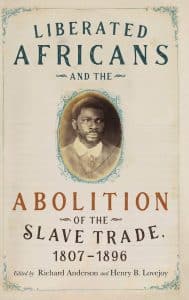NOTE: THIS WEBSITE IS A WORK IN PROGRESS. RESOURCES AND DATA ARE ADDED DAILY.
IMPORTANT: We are in urgent need of funding to keep this project alive and ensure its future. If you’re enjoying the site and see our vision for the project, please consider contributing to the Melungeon Roots crowdfunding campaign today. It is only with your help that we can continue this work. MORE INFO / DONATE
Thanks so much for your support! – Jes
![]()
Liberated Africans and the Abolition of the Slave Trade, 1807-1896
share:
Some buttons on this page link to external websites. If you visit one of our affiliate sites and make a purchase, I may receive a small commission at no extra cost to you. More info
- UPDATED: 6.29.2025
- status: to be worked
- American history, Black history, history
editor:
Richard Anderson, Henry B. Lovejoy
publisher:
date:
1.2.2020
ISBN:
9781580469692
pages:
480
notes:
contents:
description:
In 1807, Britain and the United States passed legislation limiting and ultimately prohibiting the transoceanic slave trade. As world powers negotiated anti-slave-trade treaties thereafter, British, Portuguese, Spanish, Brazilian,French, and US authorities seized ships suspected of illegal slave trading, raided slave barracoons, and detained newly landed slaves. The judicial processes in a network of the world's first international courts of humanitarian justice not only resulted in the "liberation" of nearly two hundred thousand people but also generated an extensive archive of documents. Liberated Africans and the Abolition of the Slave Trade, 1807-1896 makes use of theserecords to illuminate the fates of former slaves, many of whom were released from bondage only to be conscripted into extended periods of indentured servitude.
Essays in this collection explore a range of topics relatedto those often referred to as "Liberated Africans"-a designation that, the authors show, should be met with skepticism. Contributors share an emphasis on the human consequences for Africans of the abolitionist legislation. The collection is deeply comparative, looking at conditions in British colonies such as Sierra Leone, the Gambia, and the Cape Colony as well as slave-plantation economies such as Brazil, Cuba, and Mauritius. A groundbreaking intervention in the study of slavery, abolition, and emancipation, this volume will be welcomed by scholars, students, and all who care about the global legacy of slavery.
peoples:
CMOS:
author-date:
Other Resources
- Lee County, Virginia: History Revealed Through Biographical and Genealogical Sketches of Its Ancestors
- Othello’s Children in the “New World”: Moorish History & Identity in the African American Experience
- Up Cutshin & Down Greasy: Folkways of a Kentucky Mountain Family
- Washed in the Blood
- The Gullah: The History and Legacy of the African American Ethnic Group in the American Southeast
- Hoodoo Medicine: Gullah Herbal Remedies

